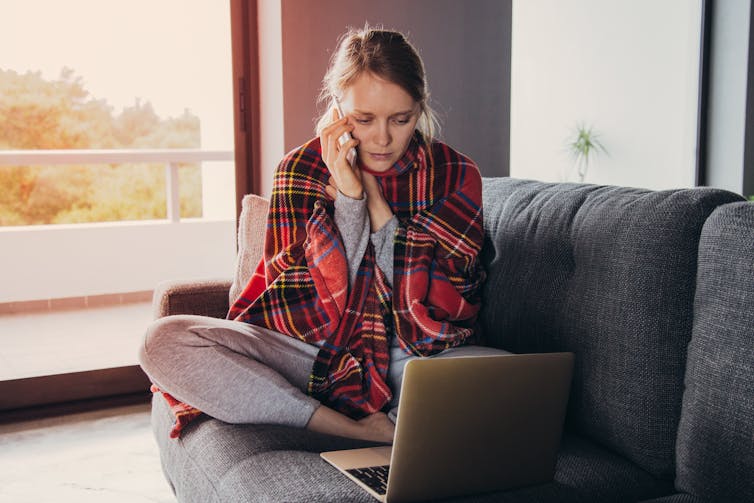What can you expect if you get a call from a COVID contact tracer?
- Written by Tambri Housen, Epidemiologist | Senior Research Fellow, National Centre for Epidemiology and Population Health, Australian National University
“Test, trace and isolate” has become the catch cry of the COVID-19 pandemic. It’s recognised as an essential strategy for containing the spread of the virus.
The “trace” part, of course, refers to contact tracing — the process of identifying people who may have come into contact with an infected person, so we can prevent further transmission of the virus.
Contact tracing can only be successful if three things happen:
the contact tracer asks the right questions
the person who has tested positive provides detailed and accurate information on whom they’ve had contact with
every person identified as a close contact can be reached and quarantines as requested.
So what can you expect if a contact tracer calls you?
Read more: Explainer: what is contact tracing and how does it help limit the coronavirus spread?
The contact tracer’s puzzle
If you’ve tested positive for COVID-19, a public health officer will call to interview you. The contact tracer is interested in two specific time periods.
The first piece of the contact-tracing puzzle is the time from two days before you developed your first symptoms until the time you began your isolation. This is known as the “infectious period”.
If you didn’t develop symptoms, you will be asked about the two days prior to your test and the period after you were tested until you began isolating.
Contact tracers are interested in the infectious period because this is when someone who has tested positive is most likely to infect others.
 Contact tracers seek to find out who you might have passed the virus onto.
Shutterstock
Contact tracers seek to find out who you might have passed the virus onto.
Shutterstock
Contact tracers will ask you to recall everywhere you went during your infectious period, whom you were with, what type of contact you had with each person, and for how long.
For example, if you went to the pub for dinner you’re likely to be asked:
where did you sit?
who was with you?
how long were you at the pub for?
did the staff serve at the table or did you order at the bar?
did you go to the bathroom?
was there social distancing?
did you talk to anyone else (other than the people you were with)?
There might be more questions too.
Based on all this information, contact tracers will determine who meets the definition of a close contact and therefore needs to be called, asked to quarantine, and followed up to check if they develop symptoms.
Read more: How long are you infectious when you have coronavirus?
The second piece of the puzzle is the “incubation period”. Experts believe the incubation period for COVID-19 is up to 14 days. This means if you’re going to develop COVID symptoms, it’s likely to happen within 14 days of you being exposed to the virus.
So, if you test positive, contact tracers will also ask you where you’ve been and whom you were with for the 14 days before you developed symptoms.
For contact tracers this information is essential. It can be the difference between being able to stop the spread or seeing many more people become infected with the virus.
When two or more people who have tested positive for COVID-19 report being at the same place at the same time, this leads to a more in-depth epidemiological investigation, and can help identify other people who may have also been exposed to the virus at this place and time.
Essentially, the first piece of the puzzle is about ascertaining to whom you might have spread the virus, whereas the second is more concerned with whom you might have picked it up from.
What if I can’t remember?
Many of us can’t remember what we did two days ago, let alone every day for 14 days. Contact tracers may use a variety of tools to help you remember where you were and what you were doing.
They may ask you to look up your bank statements to recall where you used your debit or credit card (they won’t ask to see this, but it can help jog your memory). They may also ask you to check your text messages, social media posts and photos you’ve taken on your phone as a way of helping you remember.
What about my right to privacy?
It’s not usual to be asked about where you were every minute of every day. On top of dealing with the diagnosis of COVID-19, this can be a confronting experience. It can feel like an invasion of privacy and it might feel threatening.
Some people may be involved in things they don’t want others, including people close to them, to know about. For example, a teenager may not want their parents to find out they were somewhere they shouldn’t have been; an adult having an affair or taking part in an illegal activity may want to keep their movements private.
There are many reasons people may not feel comfortable disclosing their exact movements at every moment of the day to a stranger on the phone.
However, if you are in this position, to keep your loved ones and community safe, it’s essential you answer the contact tracer’s questions honestly and to the very best of your ability.
Contact tracers are not there to judge you, report you or get you into trouble. They’re bound by the Privacy Act 1988, which sets out that health information can only be used for the primary purpose for which it is collected. So information collected through contact tracing can only be used for contact tracing.
 A contact tracing call can be confronting.
Shutterstock
A contact tracing call can be confronting.
Shutterstock
Ensuring confidence in the process
It’s important to understand there may be many reasons why people make decisions to disclose or not disclose particular things.
Last week, authorities made judgemental statements and revealed the gender, nationality and place of work of the person in South Australia who tested positive for COVID-19 and didn’t fully disclose their movements. This “blame game”, which spread to the media and onto social media, is not OK.
We need to build a culture of trust so people feel comfortable disclosing personal and private information, knowing they won’t be judged or punished as a result. This is how we’ll get the best results from contact tracing.
Read more: Hating on the Woodville Pizza guy won't fix a problem that was entirely foreseeable
Authors: Tambri Housen, Epidemiologist | Senior Research Fellow, National Centre for Epidemiology and Population Health, Australian National University
Read more https://theconversation.com/what-can-you-expect-if-you-get-a-call-from-a-covid-contact-tracer-150742





